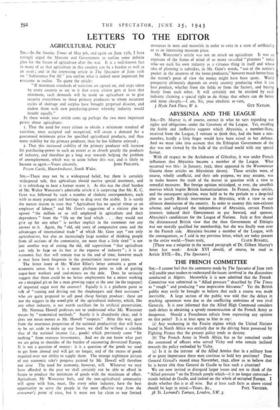THE FRENCH COMMITTEE Sta,—I cannot feel that the comments made
by The Spectator of June t9th will enable your readers to understand the issues involved in the discussions conducted at Algiers. Meanwhile it is now admitted that the .French Committee was submitted to "Allied pressure" described by The Times as " rough" and producing "une impression blessante." Yet the British
public may easily be brought to believe that such a course was made inevitable. A large section of the public was told that the delays in reaching agreement were due to the conflicting ambitions of two rival Generals. It is now informed that the Allied High Command considers such delays in obtaining a speedy reconstruction of the French Army as dangerous. Should a Frenchman refrain from expressing any opinion on that point? It is at least open to him to say: (a) Any weakening in the Fascist regime which the United Nations found in North Africa was entirely due to the driving force possessed by Fighting France that the present policy tends to destroy.
(b) The French Army in North Africa has so far remained under the command of officers who served Vichy and who remain inclined towards the policy embodied by Vichy.
(c) Is it in the interest' of the Allied Armies that in a military base of so great importance these men continue to hold key positions? Does General Giraud's record since November, 1942, allow us to believe that he is better able than General de Gaulle to face such a situation?
We are now invited to disregard larger issues and not to think of the " Allied pressure " on the French people which—it is no longer contested— stands behind de Gaulle, and indeed on the whole of occupied Europe. I doubt whether this is at all wise. But at least such facts as above stated should be kept in mind.—Yours &c., PAUL VAUCHER. 38 Sr. Leonard's Terrace, London, S.W. 3.






























 Previous page
Previous page